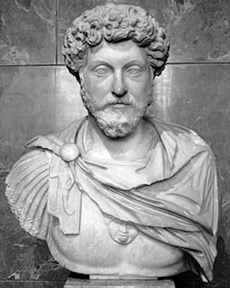Epictetus: from slave to sage
 Philosophy is a sphere where strange things happen. For instance,
philosophers are usually born and not produced by universities.
Philosophy departments of universities are rarely headed by
philosophers. Bertrand Russell and Ayn Rand are two well-known
exceptions to the general rule. On the other hand, even a slave could
become a philosopher. Epictetus is a shining example. Philosophy is a sphere where strange things happen. For instance,
philosophers are usually born and not produced by universities.
Philosophy departments of universities are rarely headed by
philosophers. Bertrand Russell and Ayn Rand are two well-known
exceptions to the general rule. On the other hand, even a slave could
become a philosopher. Epictetus is a shining example.
Epictetus was Greek by birth. However, he lived in Rome as a slave
and later as a free man. He was born in about the middle of the first
century AD. Unlike other slaves, Epictetus studied Stoicism and followed
the old Stoic tradition. In fact he tried to revive the early
inspiration of Zeno by insisting on the “conformity with nature or
reason.” In his view anybody could master their fate through control of
the will. Through the control or elimination of all feelings whatever is
the only rational goal.
Like Socrates, Epictetus has not left any of his writings for
posterity. However, some of his pupils, notably Arrian, have vividly
preserved some of his ideas. The philosophy of Epictetus can be summed
up in his own words: “And how is it possible for a man who has nothing,
who is naked, without home or hearth, in squalor, without a slave,
without a city, to live serenely? Look at me. I am without a home,
without a city, without property, without a slave; I sleep on the
ground; I have neither wife nor children, no miserable governor’s
mansion, but only earth and sky, and one rough cloak... who, when he
lays eyes upon me, does not feel that he is seeing his king and his
master?”
Stoicism
Although the philosophical school known as Stoicism was founded in
Greece by Zeno (c.334-262 BCE), it flourished in Rome. It was because
Zeno lectured at a place called the Stoa Poikile and his followers were
known as Stoics.
|

Epictetus: Bear and forbear |
When Alexander’s empire fell apart after his death, Rome annexed
Greece as a Roman province and began to control the entire Mediterranean
area. Unlike the Greeks, the Romans were not interested in abstract
thinking. They were more pragmatic and religiously tolerant. To
establish social order, the Romans depended heavily on Stoicism because
the Stoics’ emphasis was on duty and self-control.
During the Roman period there were two great philosophers who exerted
their influence on the kingdom. One was Epictetus and the other was
Marcus Aurelius. The former was a Roman slave and the latter was a Roman
emperor. The Roman Senator Seneca was a fine Stoic writer although he
was not an original thinker.
Great insight
Stoicism appealed to Romans because they were living in times of
great uncertainty under emperors of widely differing abilities. Three
Roman public figures, Cicero, Cato and Seneca advocated Stoicism and it
soon spread throughout the Roman empire. One of the most important Stoic
philosophers was Epictetus (c.50-130 BCE) who, as a slave, had acquired
great insight into Stoicism. He believed that we can control what we can
but we must accept what is beyond our control.
Being a slave of a slave mother, Eictetus demonstrated unusual
abilities. Young Epictetus had the fortune of studying with Musonius
Rufus, the most powerful Stoic at the time. Even then Epictetus knew
that he could be bought, sold or tortured. Even as a slave, he had
absolute control over what happened to him. His motto was “Bear and
forbear.”
While he was a slave Epictetus was badly tortured by his master. His
leg was twisted and broken and it never healed properly. While his
master was twisting his leg, Epictetus told him that his leg might be
broken under such torture. The master, however, ignored his pleadings
and kept on twisting the leg. Finally he broke Epictetus’s leg. Later
Epictetus said he could control his attitude but fate controlled his
life.
After Nero’s death, Epictetus was freed from slavery. Then he became
a well-known teacher of Stoicism. When the Roman emperor Domitian
ordered all philosophers to leave Rome, Epictetus was 90 years old. He
fled to Nicopolis in Greece where he started teaching. He remained a
popular teacher of philosophy until his death.
Diogenes
Epictetus did not follow in the footsteps of Diogenes but remained a
simple man. He lived in a small house with little furniture. He slept on
a straw mat and used a clay lamp. He loved children and advised those
who came to him.
“What is the fruit of your Stoic doctrines?” someone asked Epictetus.
He said, “Tranquillity, fearlessness and freedom. Controlling your
emotions is difficult but can be empowering.”
Epictetus was concerned mainly with the problem of morality. He said
humans are basically irrational beings. However, the universe ruled by
God was perfect. According to him, humans should not waste their time
and energy to attain worldly ends because destiny ruled everything.
Therefore, we must calmly accept our helplessness before fate. He also
said that we must be tolerant of the faults of others because of our own
weakness.
Much water has flowed under the bridge since Epictetus and his
philosophy. However, he has left his indelible mark as a remarkable
Stoic philosopher in the annals of Western philosophy. |

